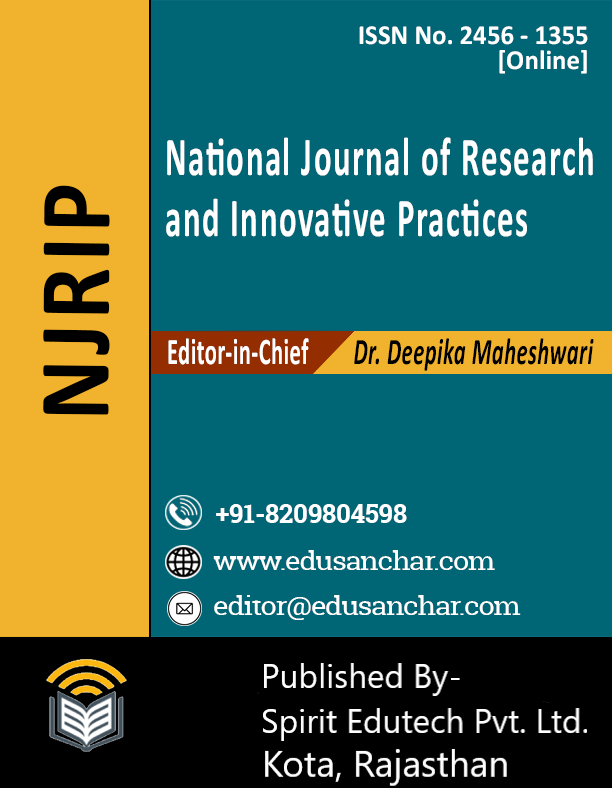
Challenges and Opportunities in Online/Hybrid Education for Hearing-Impaired Students in the Context of NEP 2020
Author Name :- Mrs. Pinki devi,,
Journal type:- NJRIP-National Journal of Research and Innovative Practices
Research Field Area :- Department of Education ; Volume 10, Issue 9, No. of Pages: 17
Your Research Paper Id :- 2025010906
Download Published File :- Click here
Abstraction :-
Keywords :-
NEP 2020; Online Education; Hybrid Education; Hearing-Impaired Students; Inclusive Education; Accessibility; Digital Learning
References :-
• Ministry of Education. (2020). National Education Policy 2020. Government of India. Retrieved from https://www.education.gov.in/nep2020
• Booth, T., & Ainscow, M. (2011). Index for Inclusion: Developing learning and participation in schools (3rd ed.). Bristol: Centre for Studies on Inclusive Education. (pp. 15–38)
• NCF (2005). National Curriculum Framework 2005. New Delhi: NCERT. Retrieved from https://ncert.nic.in/pdf/nc-framework/nf2005-english.pdf
• Sharma, R. A. (2018). Fundamentals of Inclusive Education. Meerut: R. Lal Book Depot. (pp. 101–120)
• UNESCO. (1994). The Salamanca Statement and Framework for Action on Special Needs Education. Paris: UNESCO. (pp. 6–12) Retrieved from https://unesdoc.unesco.org/ark:/48223/pf0000098427
• Singal, N. (2006). Inclusive education in India: International concept, national interpretation. International Journal of Disability, Development and Education, 53(3), 351–369. https://doi.org/10.1080/10349120600847797
• NCERT. (2011). Education of Children with Special Needs. New Delhi: NCERT. (pp. 55–70)
• Pandey, K. P. (2019). Samaveshi Shiksha ke Adhar. Allahabad: Vinod Pustak Mandir. (pp. 88–104)
• Government of India. (2006). National Policy for Persons with Disabilities. Ministry of Social Justice and Empowerment. (pp. 3–9)
• Arora, G. L. (2014). Teachers and Inclusive Education. New Delhi: Shipra Publications. (pp. 45–62)
• Thomas, G. & Loxley, A. (2021). Deconstructing Special Education and Constructing Inclusion (3rd ed.). Open University Press. (pp. 72–96)
• NEP 2020 Implementation Plan. (2021). School Education Transformation. Retrieved from https://www.education.gov.in/sites/upload_files/mhrd/files/nep2020_implementation.pdf
• Aggarwal, J. C. (2015). Theory and Principles of Education. New Delhi: Vikas Publishing House. (pp. 211–225)
• UNICEF. (2017). Inclusive education: Ensuring access and learning for all. New York: UNICEF. Retrieved from https://www.unicef.org/education/inclusive-education
• Rao, I. (2018). Preparing teachers for inclusive education. Indian Journal of Special Education, 33(2), 45–57. (pp. 46–50)
• Kothari Commission Report. (1966). Education and National Development. Government of India. (pp. 145–162)
• Sharma, U., & Deppeler, J. (2005). Integrated education in India: Challenges and prospects. Disability Studies Quarterly, 25(2). Retrieved from https://dsq-sds.org/article/view/528
• National Council for Teacher Education (NCTE). (2014). Guidelines for Inclusive Teacher Education Curriculum. New Delhi: NCTE. (pp. 12–27)


